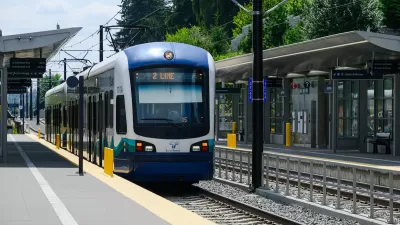As Seattle considers a $900 million levy proposed by Mayor Ed Murray, locals are already wondering if new transit investments are precursor of unwanted gentrification.
Daniel Person writes about the controversy embedded in a proposal by Seattle Mayor Ed Murray that would fund, among many other projects, a new light rail stop at Graham Street in Hillman City.
"The stop has been the subject of a Change.org petition—it has 1,088 signatures—and is framed by some as a tangible way to help Seattle’s poor and immigrant communities (the neighborhood around Graham Street and Martin Luther King Jr. Way is home to strong Filipino and East Asian populations)," reports Person, who even cites the recent study by Harvard researchers citing transportation as a key factor in poverty.
But the proposition of improving transit access to alleviate poverty isn’t a simple proposition: "In a sign of just how much gentrification is on everyone’s mind in Seattle, even at a press conference called to promote Murray’s package, support for the new light rail station came with the caveat that gentrification would have to be addressed."
Person follows that concern with a question about what tools the city has to mitigate the impacts of gentrification and doesn't produce any good answers from the city's leaders and advocates. Councilmember Mike O'Brien, however, claims that one example of accidental success in preventing gentrification might have taken a page from the Houston model: "O’Brien says Seattle’s relative lack of planning around the initial Link line—such as zoning for high-density development around the stations—was pretty effective in preventing large-scale gentrification."
Seattle might consider the model provided by Somerville, Massachusetts, which has been working to address the challenge of gentrification along new transit lines for years.
FULL STORY: Do Light Rail and Gentrification Go Hand in Hand?

Maui's Vacation Rental Debate Turns Ugly
Verbal attacks, misinformation campaigns and fistfights plague a high-stakes debate to convert thousands of vacation rentals into long-term housing.

Planetizen Federal Action Tracker
A weekly monitor of how Trump’s orders and actions are impacting planners and planning in America.

In Urban Planning, AI Prompting Could be the New Design Thinking
Creativity has long been key to great urban design. What if we see AI as our new creative partner?

King County Supportive Housing Program Offers Hope for Unhoused Residents
The county is taking a ‘Housing First’ approach that prioritizes getting people into housing, then offering wraparound supportive services.

Researchers Use AI to Get Clearer Picture of US Housing
Analysts are using artificial intelligence to supercharge their research by allowing them to comb through data faster. Though these AI tools can be error prone, they save time and housing researchers are optimistic about the future.

Making Shared Micromobility More Inclusive
Cities and shared mobility system operators can do more to include people with disabilities in planning and operations, per a new report.
Urban Design for Planners 1: Software Tools
This six-course series explores essential urban design concepts using open source software and equips planners with the tools they need to participate fully in the urban design process.
Planning for Universal Design
Learn the tools for implementing Universal Design in planning regulations.
planning NEXT
Appalachian Highlands Housing Partners
Mpact (founded as Rail~Volution)
City of Camden Redevelopment Agency
City of Astoria
City of Portland
City of Laramie





























